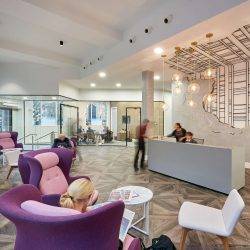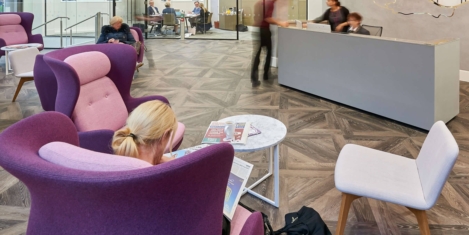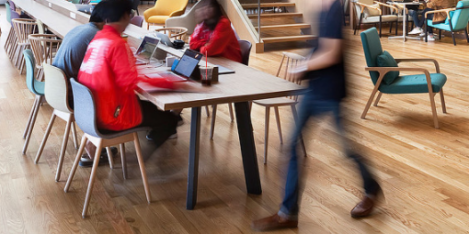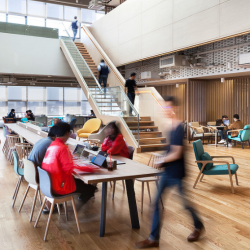To provide the best experiences, we use technologies like cookies to store and/or access device information. Consenting to these technologies will allow us to process data such as browsing behaviour or unique IDs on this site. Not consenting or withdrawing consent, may adversely affect certain features and functions.
The technical storage or access is strictly necessary for the legitimate purpose of enabling the use of a specific service explicitly requested by the subscriber or user, or for the sole purpose of carrying out the transmission of a communication over an electronic communications network.
The technical storage or access is necessary for the legitimate purpose of storing preferences that are not requested by the subscriber or user.
The technical storage or access that is used exclusively for statistical purposes.
The technical storage or access that is used exclusively for anonymous statistical purposes. Without a subpoena, voluntary compliance on the part of your Internet Service Provider, or additional records from a third party, information stored or retrieved for this purpose alone cannot usually be used to identify you.
The technical storage or access is required to create user profiles to send advertising, or to track the user on a website or across several websites for similar marketing purposes.
 Most of the analysis about the effects of the 2020 pandemic on people’s working lives has tended to involve grand statements about new normals and the death of this or that, as if everybody wants the same things, has the same personal circumstances, works in the same ways, the same places and same sectors. More →
Most of the analysis about the effects of the 2020 pandemic on people’s working lives has tended to involve grand statements about new normals and the death of this or that, as if everybody wants the same things, has the same personal circumstances, works in the same ways, the same places and same sectors. More →





 Poise by Bisley is part of the new Belong collection, which has been developed to transcend both the traditional office and homeworking environments. The Poise range consists of a variety of desking and table options, which can either be used as stand-alone pieces of furniture or sit together to form a cohesive office setting. Calling on Bisley’s heritage in workplace innovation, all have been designed in response to the events of 2020, seamlessly adapting to fit either the home or a commercial office environment.
Poise by Bisley is part of the new Belong collection, which has been developed to transcend both the traditional office and homeworking environments. The Poise range consists of a variety of desking and table options, which can either be used as stand-alone pieces of furniture or sit together to form a cohesive office setting. Calling on Bisley’s heritage in workplace innovation, all have been designed in response to the events of 2020, seamlessly adapting to fit either the home or a commercial office environment. 
 Staff need on average three days a week (2.91) in the office to achieve maximum productivity, according to a new study by
Staff need on average three days a week (2.91) in the office to achieve maximum productivity, according to a new study by 
 A survey issued by architecture, design, and planning firm
A survey issued by architecture, design, and planning firm 
 In the
In the 
 GlobalWebIndex (GWI), together with LinkedIn’s B2B Institute, has launched “
GlobalWebIndex (GWI), together with LinkedIn’s B2B Institute, has launched “
 The construction sector, the real estate industry and city planners must give high priority to the same goal – to drastically reduce their climate impacts. Powerful, combined efforts across all of the built environment sectors are absolutely crucial for the potential to achieve the UN’s sustainability goals. And what’s more – everything has to happen very quickly. These are the cornerstones to a roadmap presented at the recent
The construction sector, the real estate industry and city planners must give high priority to the same goal – to drastically reduce their climate impacts. Powerful, combined efforts across all of the built environment sectors are absolutely crucial for the potential to achieve the UN’s sustainability goals. And what’s more – everything has to happen very quickly. These are the cornerstones to a roadmap presented at the recent 
 In times of economic stability, entrepreneurs who exude self-confidence are the most likely to thrive. However, when faced with unstable and adverse economic conditions, those entrepreneurs who possess greater resilience are most likely to come out on top, according to new research from
In times of economic stability, entrepreneurs who exude self-confidence are the most likely to thrive. However, when faced with unstable and adverse economic conditions, those entrepreneurs who possess greater resilience are most likely to come out on top, according to new research from 
 A vast majority of managers (75 percent) faced challenges with employees when working remotely, causing concerns within businesses preparing for the second UK lockdown.
A vast majority of managers (75 percent) faced challenges with employees when working remotely, causing concerns within businesses preparing for the second UK lockdown. 
 A new award recognising the work undertaken by building services professionals and the wider supply chain to combat the effects of COVID-19 has been set up by
A new award recognising the work undertaken by building services professionals and the wider supply chain to combat the effects of COVID-19 has been set up by 











December 10, 2020
Employers should explain their monitoring policies to workers
by Chioma Iwunze • Comment, Workplace